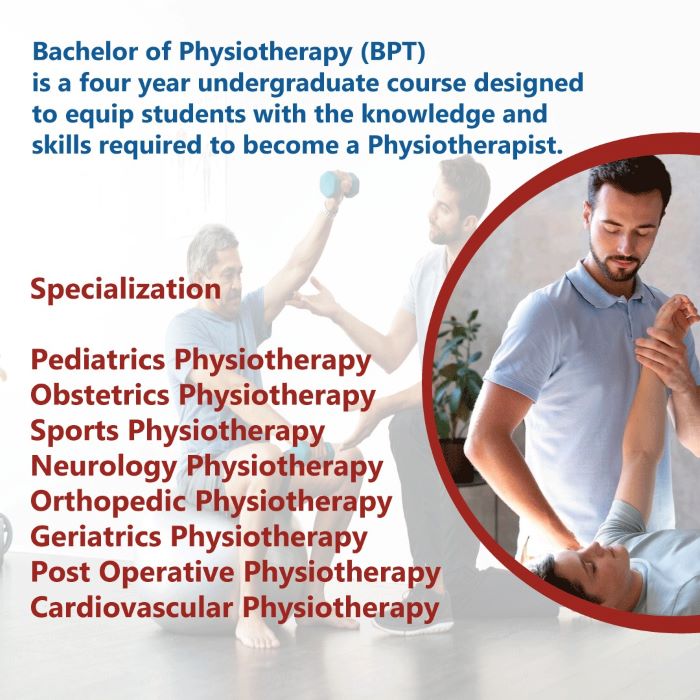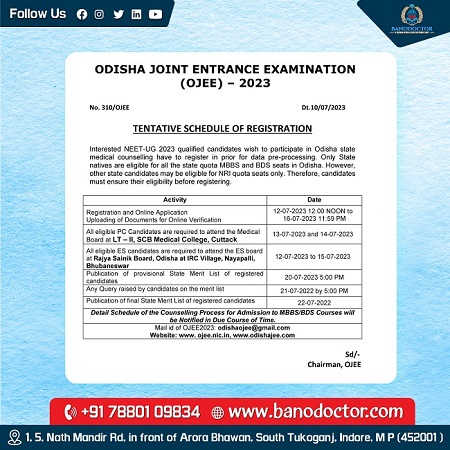Introduction to BPT Course
The Bachelor of Physiotherapy (BPT) course is a comprehensive undergraduate program that focuses on the study of physiotherapy and its various aspects. It is an ideal course for those who are interested in understanding the human body, its movement, and the application of therapeutic techniques to improve health and wellbeing
Physiotherapy is a rapidly growing field that plays a crucial role in the healthcare industry. With the increasing demand for quality healthcare services, there is a need for skilled physiotherapists who can contribute to the overall wellness of individuals. The BPT course aims to provide the necessary knowledge and skills to students to excel in this field.
Course Duration
The duration of the BPT course may vary depending on the university and country. In general, the course is completed over a period of four years. During these four years, students gain a comprehensive understanding of subjects such as anatomy, physiology, kinesiology, biomechanics, pathology, and exercise therapy.
Course Curriculum
The curriculum of the BPT course is designed to provide students with a strong foundation in physiotherapy principles and practices. It includes theoretical coursework, practical training, clinical internships, and research projects. The coursework covers various areas of study, including musculoskeletal, cardiovascular, respiratory, neurology, and community physiotherapy.
Students also learn about the different techniques and methods used in physiotherapy, such as manual therapy, therapeutic exercises, electrotherapy, and hydrotherapy. The course curriculum is regularly updated to incorporate the latest advancements and research in the field.
Career Opportunities
Completing a BPT course opens up a wide range of career opportunities for graduates. Physiotherapists are in demand in various healthcare settings, including hospitals, rehabilitation centers, sports clinics, government organizations, and private practices.
Graduates can choose to specialize in a particular field of physiotherapy, such as orthopedics, pediatric physiotherapy, sports physiotherapy, neurorehabilitation, or cardiopulmonary physiotherapy. They can also pursue higher studies and research in the field, leading to advanced degrees and specializations.
Physiotherapists play a vital role in helping individuals recover from injuries, manage chronic conditions, improve their overall mobility and function, and enhance their quality of life. With the increasing awareness of the importance of physical fitness and wellness, the demand for physiotherapists is expected to grow significantly in the coming years.
In conclusion, the Bachelor of Physiotherapy (BPT) course provides students with a comprehensive understanding of physiotherapy principles and practices. It equips graduates with the necessary knowledge and skills to pursue a rewarding career in healthcare. With excellent career opportunities, the BPT course is an excellent choice for those interested in making a positive impact on the health and wellbeing of individuals.
Curriculum and Subjects Covered in BPT Course
The Bachelor of Physiotherapy (BPT) course curriculum is designed to provide students with a comprehensive understanding of the human body, its functions, and the management of various physical ailments. The duration of the course may vary depending on the university or institution offering it, but generally, it spans over a period of four years, divided into eight semesters.
During the course, students are exposed to a wide range of subjects that are essential for developing their knowledge and skills in the field of physiotherapy. The curriculum includes a combination of theoretical lectures, practical sessions, and clinical experience to ensure holistic learning. Here are some of the main subjects covered in the BPT course:
- Anatomy: This subject focuses on studying the structure and organization of the human body, including its organs, tissues, and systems.
- Physiology: It deals with the study of the normal functions of the human body and its various physiological processes.
- Biomechanics: This subject explores the mechanics of human movement and applies principles of physics to understand the interaction between the body and its external forces.
- Exercise Therapy: It involves learning different therapeutic exercises and their applications in managing various musculoskeletal and neurological conditions.
- Physiotherapy in Neurology: This subject covers the assessment and treatment of neurological disorders such as stroke, spinal cord injuries, and multiple sclerosis.
- Physiotherapy in Orthopedics: It focuses on the assessment and management of orthopedic conditions like fractures, muscle strains, and joint disorders.
- Physiotherapy in Cardiovascular and Respiratory Conditions: This subject deals with the evaluation and rehabilitation of patients with cardiac and respiratory diseases.
- Electrotherapy: It involves the use of electrical modalities for pain management, muscle stimulation, and tissue healing.
- Research Methodology: This subject introduces students to research techniques and methods used in physiotherapy.
- Clinical Training: Throughout the course, students are provided with supervised clinical training in hospitals or healthcare settings. This gives them the opportunity to apply their theoretical knowledge in real-life scenarios and gain hands-on experience.
It is important to note that the specific subjects covered in the BPT course may vary slightly from one university to another. However, the core subjects mentioned above are usually included in the curriculum to ensure a strong foundation in physiotherapy principles and practices.
Career Opportunities After BPT Course
A Bachelor of Physiotherapy (BPT) course opens up various career opportunities in the field of healthcare and rehabilitation. Graduates with a BPT degree possess the knowledge and skills to work in different settings, providing expert care to individuals of all ages with physical disabilities or injuries. Here are some of the career opportunities that BPT graduates can explore:
- Physiotherapist: As a physiotherapist, BPT graduates can work in hospitals, clinics, sports organizations, or rehabilitation centers. They assess patients, develop personalized treatment plans, and administer various therapeutic exercises and techniques to improve mobility, reduce pain, and enhance overall physical well-being.
- Sports Physiotherapist: BPT graduates interested in working with athletes can pursue a career as a sports physiotherapist. They play a key role in preventing and managing sports-related injuries, designing training programs, and providing rehabilitation to athletes to facilitate their recovery and optimize their performance.
- Orthopedic Physiotherapist: With specialized knowledge in orthopedics, BPT graduates can work in orthopedic hospitals or clinics. They focus on treating musculoskeletal conditions, such as fractures, joint replacements, and sports injuries, through various physical therapy techniques, including manual therapy, exercise therapy, and electrotherapy.
- Neurological Physiotherapist: BPT graduates can specialize in neurological physiotherapy to work with patients suffering from conditions like stroke, spinal cord injury, Parkinsons disease, multiple sclerosis, or traumatic brain injury. These professionals help patients regain their physical abilities, improve balance, coordination, and mobility through targeted rehabilitation exercises and techniques.
- Pediatric Physiotherapist: Working with children and infants is a rewarding career option for BPT graduates interested in pediatric physiotherapy. They provide treatment for developmental delays, orthopedic conditions, and neuromuscular disorders to help young patients enhance their physical skills and achieve age-appropriate milestones.
- Geriatric Physiotherapist: BPT graduates can also specialize in geriatric physiotherapy to work with elderly individuals. They focus on managing conditions associated with aging, such as osteoporosis, arthritis, mobility issues, and balance problems. Geriatric physiotherapists aim to enhance the quality of life and promote independence in older adults through tailored rehabilitation programs.
- Researcher or Academician: BPT graduates with a passion for research and teaching can explore careers in academia or research institutions. They can contribute to the development of physiotherapy techniques, treatment protocols, and evidence-based practices through research studies, publications, and teaching future physiotherapy professionals.
- Entrepreneur: With their knowledge and skills in physiotherapy, BPT graduates can establish their own private practice or physiotherapy clinics, offering specialized services to patients in need of rehabilitation. Starting a physiotherapy business requires careful planning, knowledge of business management, and networking skills.
- Instructor or Trainer: BPT graduates can work as instructors or trainers in educational institutions offering physiotherapy courses or in fitness centers. They can impart their expertise to aspiring physiotherapy students or provide guidance and support to individuals seeking fitness and wellness goals.
- Consultant: BPT graduates who have gained significant experience in their field can work as consultants, providing expert advice, second opinions, or developing treatment plans for complex or challenging cases. Consultants may work independently or in collaboration with other healthcare professionals.
These career opportunities highlight the diverse pathways available to BPT graduates, depending on their interests, specialization, and experience. It is essential for aspiring physiotherapists to remain updated with advancements in the field, attend professional development programs, and acquire relevant certifications to enhance their career prospects. Benefits of Pursuing a BPT Course
1. Exciting Career Opportunities:
A Bachelor of Physiotherapy (BPT) course opens up a plethora of exciting career opportunities. Graduates can work in various healthcare settings, including hospitals, clinics, sports facilities, rehabilitation centers, and even in academic institutions as teachers or researchers. With a growing emphasis on holistic healthcare, the demand for physiotherapists is increasing, offering graduates numerous career options to explore.
2. Hands-on Learning Experience:
One of the key benefits of pursuing a BPT course is the opportunity for hands-on learning experience. Students get the chance to apply theoretical knowledge in practical settings through internships and clinical placements. This practical exposure helps them develop essential skills such as patient assessment, treatment planning, and rehabilitation techniques. Such experiential learning not only enhances their professional competence but also builds confidence in their abilities
3. Impactful Work:
Physiotherapy is a rewarding profession that makes a significant impact on the lives of patients. By helping individuals regain their mobility, reduce pain, and improve their overall quality of life, physiotherapists play a vital role in the healthcare system. The gratification that comes from witnessing the positive changes in patients' lives can be immensely fulfilling and serves as a source of motivation for those pursuing a career in physiotherapy.
4. Job Satisfaction:
Job satisfaction is a crucial factor when considering a career path, and physiotherapy offers great job satisfaction. As a physiotherapist, you can contribute to the well-being and recovery of individuals facing physical challenges. The ability to witness your patients' progress and help them achieve their goals can be highly fulfilling. Moreover, the field of physiotherapy often provides opportunities for professional growth, allowing you to continually expand your knowledge and skills.
5. Flexibility and Mobility:
A BPT degree provides graduates with flexibility and mobility in their careers. Physiotherapists have the option to work in different settings, from hospitals and private clinics to sports teams or even start their own practice. This flexibility allows professionals to shape their career according to their interests and goals. Furthermore, physiotherapists also have opportunities to work abroad or travel as part of their jobs, adding an element of adventure to their professional journey.
6. Continuous Learning:
The field of physiotherapy is constantly evolving, with new techniques, technologies, and research emerging regularly. Pursuing a BPT course ensures that you stay updated with the latest advancements in the field. Continuous learning is not only important for professional growth but also allows physiotherapists to provide the best possible care to their patients. Whether it's attending workshops, conferences, or participating in research projects, there are numerous avenues for ongoing education and personal development within the field of physiotherapy.
In conclusion, pursuing a BPT course can offer numerous benefits, including a wide range of career opportunities, hands-on learning experiences, the ability to make a meaningful impact on patients' lives, job satisfaction, flexibility, and continuous learning.
Skills and Qualities Required for BPT Course
To excel in a Bachelor of Physiotherapy (BPT) course, certain skills and qualities are essential. Here are the key attributes that students pursuing a BPT course should possess:
- Scientific aptitude: A strong foundation in science subjects such as biology, physics, and chemistry is crucial for understanding the complex concepts and principles involved in physiotherapy. Students should have a keen interest and aptitude for scientific subjects.
- Interpersonal skills: Since physiotherapy involves working closely with patients, effective communication and interpersonal skills are vital. The ability to establish rapport, listen empathetically, and communicate clearly are essential for building trust and ensuring successful patient interactions.
- Physical fitness: Physiotherapy often involves physical activities such as assisting patients in performing exercises, providing manual therapy, and assisting with mobility. Students should possess a good level of physical fitness and stamina to carry out these tasks effectively.
- Critical thinking and problem-solving abilities: Physiotherapists need to analyze and assess patient conditions, develop treatment plans, and adapt techniques according to individual needs. Strong critical thinking, analytical skills, and problem-solving abilities are essential for making accurate diagnoses and providing effective treatment.
- Manual dexterity: Physiotherapy interventions often require precise hand-eye coordination and manual skills. Students should have good motor skills and dexterity to administer therapeutic techniques such as massages, joint mobilization, and taping.
- Empathy and compassion: Physiotherapy involves working with individuals who may be experiencing pain, discomfort, or physical limitations. Demonstrating empathy, compassion, and a genuine desire to help others are crucial qualities for providing patient-centered care and support.
- Ethical and professional behavior: As healthcare professionals, physiotherapists are expected to adhere to ethical guidelines and maintain professional behavior. Students should understand and demonstrate ethical standards, integrity, and professionalism in their interactions with patients, colleagues, and the healthcare system.
- Adaptability and resilience: A career in physiotherapy can be demanding and challenging. Students should be able to adapt to different patient needs, work in diverse healthcare settings, and manage the physical and emotional demands of the profession. Resilience and the ability to cope with stress are vital for maintaining a successful career in physiotherapy.
By possessing these skills and qualities, aspiring physiotherapists can maximize their learning experience during the BPT course and enhance their prospects of building a successful career in the field.
Internship and Practical Experience in BPT Course
One of the significant aspects of the Bachelor of Physiotherapy (BPT) course is the emphasis on practical experience and internships. These practical components play a crucial role in shaping students' understanding and skills in the field of physiotherapy.
1. Internship Opportunities
During the BPT course, students are offered various internship opportunities to gain hands-on experience in real-world settings. These internships usually take place in hospitals, clinics, rehabilitation centers, and sports facilities. Through these internships, students get the chance to work closely with experienced professionals and apply their theoretical knowledge to practical scenarios.
2. Clinical Exposure
Clinical exposure is an integral part of the BPT course, allowing students to interact with patients and participate in their treatment. This exposure provides students with a deeper understanding of different physiotherapy techniques and their practical application. It also helps them develop essential skills, such as patient assessment, treatment planning, and therapeutic intervention.
3. Skill Development
Internships and practical experiences offer students the opportunity to develop and refine their skills in various areas of physiotherapy. These include manual therapy techniques, exercise prescription, electrotherapy, and specialized treatments for specific conditions or injuries. Students also learn to use and interpret various diagnostic tools, such as X-rays, MRI scans, and ultrasound, to assist in their treatment decision-making process.
4. Collaboration and Teamwork
Working in a clinical environment during internships allows BPT students to develop strong collaborative skills and work effectively in a team. They learn to communicate with other healthcare professionals, such as doctors, nurses, and occupational therapists, to ensure holistic patient care. These teamwork experiences are essential for their future careers as physiotherapists, where collaboration with other professionals is necessary for comprehensive care.
5. Practical Competence
The practical experience gained during internships and clinical exposure helps in building a solid foundation of practical competence among BPT students. They learn to perform various assessment techniques, develop individualized treatment plans, and monitor patient progress. This hands-on experience enhances their confidence in handling different cases and prepares them for the challenges they may encounter in their professional careers.
6. Networking and Professional Development
Internships provide students with an excellent platform to network with professionals in the field of physiotherapy. They get the opportunity to learn from experienced practitioners, seek mentorship, and gain valuable insights into the profession. Building these professional connections and relationships during internships can open doors to future job opportunities and career advancement.
In conclusion, internships and practical experience are integral components of the BPT course, allowing students to apply their theoretical knowledge, develop practical skills, and gain real-world experience in the field of physiotherapy. These experiences not only enhance their competence but also provide networking opportunities and prepare them for future career success.
Comparison of BPT with Other Allied Health Courses
When deciding on a career in the healthcare field, it is crucial to consider the various options available. Among the numerous allied health courses, the Bachelor of Physiotherapy (BPT) holds its own unique place. However, it is essential to have a comprehensive understanding of the similarities and differences between BPT and other allied health courses to make an informed decision. Here, we present a comparison of BPT with some of the commonly sought-after allied health courses:
BPT vs. Bachelor of Occupational Therapy (BOT):
Both BPT and BOT are allied health courses that deal with improving the quality of life of individuals with physical conditions. While BPT focuses on physical therapy and rehabilitation, BOT emphasizes helping individuals manage their daily activities and promotes their independence. Ultimately, the choice between BPT and BOT depends on the specific area of interest and career goals.
BPT vs. Bachelor of Pharmacy (B.Pharm):
Although both BPT and B.Pharm fall under the allied health sciences field, they differ significantly in their focus. BPT primarily concentrates on providing non-surgical treatment options to patients through physical exercise, manual therapy, and other techniques. On the other hand, B.Pharm focuses on studying medications, pharmaceuticals, and drug therapy, enabling graduates to work as pharmacists in various settings.
BPT vs. Bachelor of Medical Laboratory Technology (BMLT):
BPT and BMLT are distinct allied health courses that cater to different aspects of healthcare. BPT focuses on treating and rehabilitating patients through physical therapy interventions, while BMLT primarily deals with conducting laboratory tests, analyzing samples, and diagnosing diseases. The choice between the two should be based on personal interests and aptitude.
BPT vs. Bachelor of Science in Nursing (BSN):
BPT and BSN both provide opportunities to work directly with patients and contribute to their overall health and well-being. BPT focuses on physical therapy techniques and interventions, while BSN prepares individuals to become registered nurses, providing holistic care to patients. The choice between BPT and BSN depends on the preferred role within the healthcare sector.
Comparison of BPT with Other Allied Health Courses
When deciding on a career in the healthcare field, it is crucial to consider the various options available. Among the numerous allied health courses, the Bachelor of Physiotherapy (BPT) holds its own unique place. However, it is essential to have a comprehensive understanding of the similarities and differences between BPT and other allied health courses to make an informed decision. Here, we present a comparison of BPT with some of the commonly sought-after allied health courses:
1. BPT vs. Bachelor of Occupational Therapy (BOT):
Both BPT and BOT are allied health courses that deal with improving the quality of life of individuals with physical conditions. While BPT focuses on physical therapy and rehabilitation, BOT emphasizes helping individuals manage their daily activities and promotes their independence. Ultimately, the choice between BPT and BOT depends on the specific area of interest and career goals.
2. BPT vs. Bachelor of Pharmacy (B.Pharm):
Although both BPT and B.Pharm fall under the allied health sciences field, they differ significantly in their focus. BPT primarily concentrates on providing non-surgical treatment options to patients through physical exercise, manual therapy, and other techniques. On the other hand, B.Pharm focuses on studying medications, pharmaceuticals, and drug therapy, enabling graduates to work as pharmacists in various settings.
3. BPT vs. Bachelor of Medical Laboratory Technology (BMLT):
BPT and BMLT are distinct allied health courses that cater to different aspects of healthcare. BPT focuses on treating and rehabilitating patients through physical therapy interventions, while BMLT primarily deals with conducting laboratory tests, analyzing samples, and diagnosing diseases. The choice between the two should be based on personal interests and aptitude.
4. BPT vs. Bachelor of Science in Nursing (BSN):
BPT and BSN both provide opportunities to work directly with patients and contribute to their overall health and well-being. BPT focuses on physical therapy techniques and interventions, while BSN prepares individuals to become registered nurses, providing holistic care to patients. The choice between BPT and BSN depends on the preferred role within the healthcare sector.
In summary, when considering a career in allied health, it is essential to compare different courses to find the one that aligns with personal interests and future aspirations. While BPT is unique in its emphasis on physical therapy, other courses such as BOT, B.Pharm, BMLT, and BSN offer distinct areas of specialization within the healthcare field. Aspirants should carefully evaluate the curriculum, career prospects, and individual preferences before making a decision.
Specializations in BPT Course
The Bachelor of Physiotherapy (BPT) course offers various specializations that students can choose from to gain specialized knowledge and skills in a specific area of physiotherapy practice. These specializations allow students to develop expertise and focus their careers in areas that interest them the most.
Here are some of the common specializations available in the BPT course:
- Orthopedic Physiotherapy: This specialization focuses on the assessment, diagnosis, and treatment of musculoskeletal conditions, including fractures, strains, sprains, and joint disorders. Students learn techniques such as mobilization, manual therapy, and exercise prescription to help patients recover from orthopedic injuries.
- Neurological Physiotherapy: This specialization deals with the evaluation and management of neurological conditions like stroke, spinal cord injuries, multiple sclerosis, and Parkinson's disease. It involves techniques such as neurodevelopmental therapy, motor relearning, and gait training to improve the functioning of the nervous system.
- Cardiorespiratory Physiotherapy: In this specialization, students learn to assess and treat patients with cardiovascular and respiratory disorders, such as heart disease, asthma, chronic obstructive pulmonary disease (COPD), and cystic fibrosis. They focus on exercises, breathing techniques, and airway clearance methods to enhance cardiorespiratory function.
- Pediatric Physiotherapy: This specialization is centered around the assessment and intervention of children with developmental delays, congenital conditions, and disabilities. Students learn techniques that cater specifically to the needs of infants, children, and adolescents, promoting their physical development and functional abilities.
- Sports Physiotherapy: Students who opt for this specialization learn to work with athletes to prevent, diagnose, and rehabilitate sports-related injuries. They acquire skills in sports injury assessment, sports taping, therapeutic exercises, and biomechanical analysis, offering specialized care to athletes of all levels.
- Geriatric Physiotherapy: This specialization focuses on the care of elderly patients and addresses age-related conditions such as osteoporosis, arthritis, and balance disorders. Students learn techniques to improve mobility, prevent falls, manage pain, and enhance the quality of life for older adults.
These are just a few examples of the specializations available in the BPT course. Other specialized areas include women's health physiotherapy, occupational health physiotherapy, and community physiotherapy. It is important for students to explore their interests and choose a specialization that aligns with their career goals.
By pursuing a specialization within the BPT course, students can become experts in their chosen field and develop skills that are highly sought after by employers. It not only enhances job prospects but also allows physiotherapists to make a meaningful impact on the lives of their patients.
Challenges and Opportunities in the BPT Field
The field of Bachelor of Physiotherapy (BPT) presents its fair share of challenges and opportunities. With the increasing demand for physiotherapy services, aspiring physiotherapists need to be prepared to tackle these challenges while making the most of the opportunities available in this field
Challenges
- Competitive job market:The job market for physiotherapy professionals can be highly competitive. With a growing number of BPT graduates every year, securing a desirable position can be challenging. It is crucial for aspiring physiotherapists to acquire additional skills, gain practical experience, and stand out from the competition to increase their chances of finding employment.
- Continuous learning:The healthcare sector is constantly evolving, requiring physiotherapists to keep themselves updated with the latest advancements and research in the field. Continuous learning and professional development are essential to provide the best possible care to patients. Physiotherapists need to be proactive in pursuing further education and attending workshops, seminars, and conferences to stay abreast of new techniques, technologies, and treatment modalities.
- Physical demands:Physiotherapy work can be physically demanding, requiring therapists to have strength, stamina, and good physical health. Treating patients, assisting with their mobility, and performing various therapeutic exercises may involve significant physical exertion. Physiotherapists must prioritize self-care and adopt ergonomic practices to prevent occupational injuries and maintain their own well-being.
- Dealing with patient challenges:Physiotherapists often work with patients who have physical impairments, disabilities, or chronic pain. Managing different patient needs, expectations, and emotional challenges can be demanding. Effective communication skills and empathy are crucial to build trust, motivate patients, and address their unique concerns throughout the treatment process.
Opportunities
- Growing demand for physiotherapy services:There is an increasing demand for physiotherapy services due to factors such as the aging population, rising awareness about the benefits of physiotherapy, and the growing prevalence of chronic diseases. This demand opens up numerous job opportunities in various settings, including hospitals, clinics, rehabilitation centers, sports facilities, and private practices.
- Diverse employment options:BPT graduates have the opportunity to explore diverse employment options in the field of physiotherapy. They can choose to specialize in areas such as sports physiotherapy, neurorehabilitation, pediatric physiotherapy, geriatric care, or orthopedics. Moreover, there is also potential for entrepreneurship, where physiotherapists can start their own clinics or consultancy services.
- International opportunities:The field of physiotherapy offers international opportunities for those who seek to work or study abroad. With increasing globalization and the need for skilled physiotherapists globally, BPT graduates can explore job prospects in different countries and gain valuable international experience.
- Career advancement:BPT graduates can pursue further education and specialization through postgraduate courses like Master of Physiotherapy (MPT) or Doctor of Physiotherapy (DPT). Specializing in a particular area of physiotherapy can enhance skills, knowledge, and career prospects, leading to opportunities for higher positions, research, teaching, or consultancy roles.
In conclusion, the BPT field presents both challenges and opportunities for aspiring physiotherapists. Overcoming the challenges will require dedication, continuous learning, and adaptability. However, the growing demand for physiotherapy services, diverse employment options, international opportunities, and possibilities for career advancement make it an exciting and rewarding field to pursue.
Conclusion and Future of BPT Course
The Bachelor of Physiotherapy (BPT) course is a promising field for students aspiring to pursue a career in healthcare. With a comprehensive curriculum that encompasses theoretical knowledge and practical skills, this course equips graduates with the necessary tools to make a difference in the lives of patients.
Throughout the article, we have explored the various aspects of the BPT course, including fees, duration, and career opportunities. We have seen that the fees for BPT courses can vary depending on the institute and location, with government institutions generally offering lower fees compared to private colleges. The duration of the course typically spans over four and a half years, including both academic and clinical training.
Furthermore, the career prospects for BPT graduates are promising. With a growing demand for physiotherapists in various healthcare settings, graduates have ample opportunities to secure employment in hospitals, rehabilitation centers, sports clinics, and private practices. Additionally, BPT graduates also have the option to explore further specialization through postgraduate courses, opening doors to advanced roles and research opportunities.
It is important to note that the field of physiotherapy is evolving constantly. Technological advancements and scientific research continue to shape the future of this profession. With the integration of innovative techniques, such as virtual reality, robotics, and telehealth, the scope of physiotherapy is expanding, providing new avenues for graduates to explore.
In the years to come, the demand for physiotherapists is expected to rise as the population ages, and the need for rehabilitative care grows. This presents an opportunity for BPT graduates to establish themselves in the field and contribute to improving the quality of life for individuals across various age groups and with diverse health conditions.
In conclusion, the BPT course offers students a comprehensive education in physiotherapy and prepares them for a rewarding career in healthcare. With the potential for growth and specialization, graduates can look forward to a future filled with opportunities to make a positive impact on the lives of others. By staying updated with advancements in the field, BPT professionals can continue to evolve and adapt to the changing needs of patients, ensuring that physiotherapy remains a vital component of healthcare.


















![Online Application Form for the National Eligibility-cum-Entrance Test [(NEET (UG)] 2024](https://www.banodoctor.com/public/notifications/1707717098.jpg)







